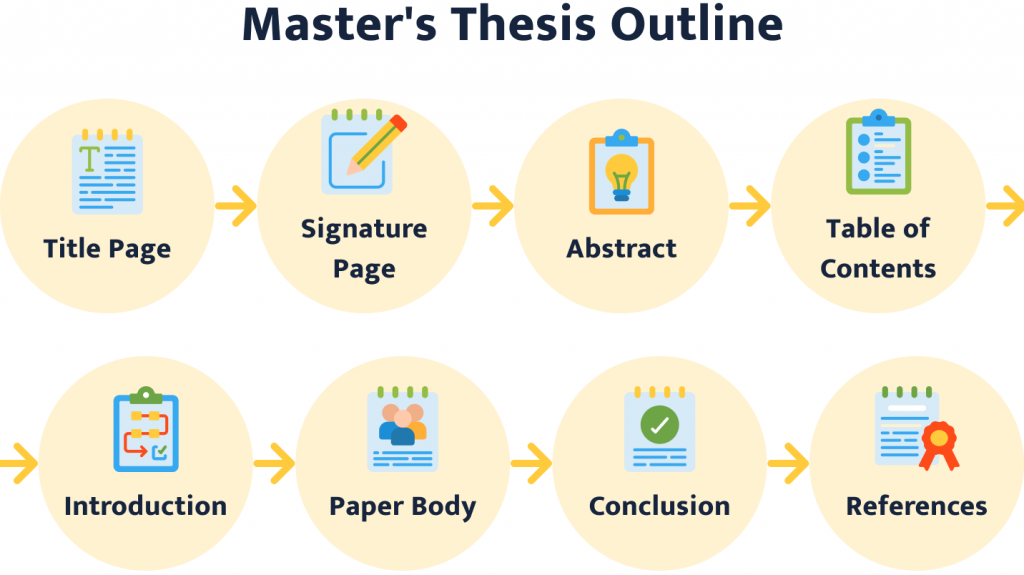The Master’s thesis is a significant milestone in a graduate student’s academic journey. It represents years of research, critical thinking, and dedicated effort culminating in a substantial piece of original scholarship. Successfully navigating the complexities of Master’s thesis writing requires careful planning, diligent execution, and a robust understanding of the process.
This article offers essential tips to guide students through every stage in the master’s thesis writing process, from initial conception to final submission.
Step-by-Step Guide to Successful Master’s Thesis Writing
I. Choosing a Topic and Defining Research Questions:
The foundation of any successful Master’s thesis writing project lies in choosing a manageable yet engaging topic. Avoid overly broad subjects that cannot be adequately explored within the timeframe and resources available. Instead, focus on a specific research question or hypothesis that can be thoroughly investigated. This requires significant preliminary reading and exploration of the existing literature.
Consider the following points when selecting your topic:
- Your interests: Choose a topic that genuinely interests you, as this will sustain your motivation throughout the often-challenging process of Master’s thesis writing.
- Feasibility: Assess the availability of data, resources, and time required to complete the research within the allotted timeframe.
- Novelty: While not requiring groundbreaking discoveries, your thesis should make a unique contribution to the existing body of knowledge, even if it’s a small one.
- Guidance from your advisor: Discuss potential topics with your advisor early on. Their expertise will be invaluable in refining your ideas and ensuring your project is both feasible and aligned with your program’s requirements.
Once you have a topic, formulate clear and concise research questions. These questions should guide your research and provide a framework for your analysis. Ensure your research questions are specific, measurable, achievable, relevant, and time-bound (SMART). A well-defined research question is crucial for successful Master’s thesis writing.
II. Developing a Strong Research Methodology:
The methodology section of your thesis outlines how you will answer your research questions. This is a critical component, requiring careful consideration of the appropriate research design, data collection methods, and analytical techniques. The choice of methodology depends heavily on your research questions and the nature of your topic. Common methodologies include:
- Qualitative research: This approach emphasizes in-depth understanding of phenomena through methods such as interviews, focus groups, and textual analysis.
- Quantitative research: This involves collecting and analyzing numerical data to test hypotheses and establish relationships between variables.
- Mixed methods research: This combines both qualitative and quantitative approaches to provide a more comprehensive understanding of the research problem.
Regardless of your chosen methodology, your thesis must clearly articulate your approach, justify your choices, and address potential limitations. Transparency and rigor are paramount in Master’s thesis writing.
III. Conducting Research and Gathering Data:
This stage involves the actual collection and analysis of data. This process can be time-consuming and require significant organization. Maintain meticulous records of your data collection, ensuring accuracy and traceability. Consider the following:
- Data management: Develop a system for organizing and storing your data. This might involve using spreadsheets, databases, or specialized software.
- Ethical considerations: Ensure your research adheres to ethical guidelines, especially concerning participant consent and data privacy.
- Time management: Break down the data collection process into smaller, manageable tasks, setting realistic deadlines for each.
IV. Writing the Thesis: Structure and Style:
The writing phase of Master’s thesis writing is arguably the most challenging. A well-structured thesis is crucial for clarity and impact. Typically, a Master’s thesis follows a standard structure:
- Abstract: A concise summary of your thesis, typically around 200-300 words.
- Introduction: Provides background information, states your research questions, and outlines your methodology.
- Literature review: A critical review of existing research relevant to your topic.
- Methodology: Details your research design, data collection methods, and analytical techniques.
- Results: Presents your findings in a clear and concise manner, using tables, figures, and charts where appropriate.
- Discussion: Interprets your results, discusses their implications, and addresses limitations of your study.
- Conclusion: Summarizes your key findings and offers concluding remarks.
- Bibliography/References: A complete list of all sources cited in your thesis.
- Appendices (if necessary): Contains supplementary materials such as questionnaires, interview transcripts, or raw data.

Maintaining a consistent writing style is also important. Adhere to the style guide specified by your institution (e.g., APA, MLA, Chicago).
V. Seeking Feedback and Revision:
The writing process is iterative. Seek feedback from your advisor, peers, and writing center professionals throughout the writing process. Be open to constructive criticism and use it to refine your thesis. Revision is a crucial part of Master’s thesis writing, allowing you to improve clarity, coherence, and argumentation.
VI. Finalizing and Submitting Your Thesis:
Before submitting your thesis, meticulously proofread your work for grammatical errors, typos, and formatting inconsistencies. Ensure all citations are accurate and complete. Following your institution’s submission guidelines is paramount. Late submissions are often penalized. Successfully completing your Master’s thesis writing is a significant achievement, reflecting your dedication and scholarly potential.
VII. Utilizing Resources for Master’s Thesis Writing:
Numerous resources are available to support Master’s thesis writing. These include:
- Your advisor: Your advisor is your primary resource and should be consulted regularly.
- University libraries: Libraries offer access to a vast range of scholarly resources.
- Writing centers: Writing centers provide assistance with writing, editing, and research skills.
- Online resources: Numerous online resources offer guidance on thesis writing, research methods, and citation styles.
VIII. The Importance of Self-Care During Master’s Thesis Writing:
The Master’s thesis writing process can be stressful and demanding. Prioritizing self-care is essential to maintain your well-being and prevent burnout. This includes:
- Getting enough sleep: Adequate sleep is crucial for cognitive function and overall health.
- Regular exercise: Physical activity helps reduce stress and improve mood.
- Healthy diet: Nourishing your body with healthy foods provides the energy needed to complete your thesis.
- Taking breaks: Regular breaks are important to avoid burnout and maintain focus.
IX. Celebrating Your Achievement:
Completing your Master’s thesis is a major accomplishment. Celebrate your success and acknowledge the hard work and dedication you invested in this significant milestone. The skills and knowledge you gained throughout the Master’s thesis writing process will serve you well in your future endeavors. Reflect on your journey, learn from your experiences, and move forward with confidence.
Common Pitfalls to Avoid in Master’s Thesis Writing
Embarking on the journey of Master’s thesis writing is a significant undertaking, demanding dedication, meticulous planning, and unwavering perseverance. While the ultimate goal is to produce a scholarly contribution, many aspiring scholars fall prey to common pitfalls that can derail their progress and compromise the quality of their work. Understanding these potential obstacles is crucial for navigating the complexities of Master’s thesis writing successfully.
1. Poorly Defined Research Question: A vague or overly broad research question is the foundation of a failing thesis. A clear, concise, and focused research question guides the entire research process. Without it, the thesis will lack direction, resulting in a rambling and unconvincing argument. The research question should be sufficiently specific to allow for in-depth investigation within the timeframe and resources available for Master’s thesis writing.
2. Inadequate Literature Review: A comprehensive and critical literature review is essential. Many students make the mistake of simply summarizing existing research without critically analyzing it or connecting it to their own research question. A strong literature review demonstrates the student’s understanding of the existing scholarship and identifies gaps in the research that their thesis aims to address. Neglecting this crucial stage in Master’s thesis writing can severely weaken the thesis’s intellectual contribution.
3. Weak Methodology: The methodology section describes how the research was conducted. A weak methodology lacks clarity, lacks rigor, or is simply inappropriate for the research question. This can render the findings unreliable and undermine the credibility of the entire thesis. Choosing the right research methods and clearly explaining their application is paramount in Master’s thesis writing.
4. Insufficient Data Analysis: Even with robust data collection, flawed or insufficient data analysis can significantly compromise the results. This can involve using inappropriate statistical techniques, failing to account for confounding variables, or drawing unwarranted conclusions from the data. Master’s thesis writing necessitates a thorough understanding of appropriate data analysis techniques and their limitations.
5. Poor Organization and Structure: A poorly structured thesis is difficult to follow and understand. The argument should flow logically from one section to the next, with clear transitions and well-defined headings and subheadings. Lack of coherence and a disorganized structure make it challenging for the reader to grasp the central argument, weakening the overall impact of the Master’s thesis writing process.
6. Lack of Time Management: Master’s thesis writing demands significant time and effort. Poor time management often leads to rushed writing, inadequate research, and ultimately, a lower quality thesis. Creating a realistic timeline, breaking down the project into manageable tasks, and sticking to deadlines is essential for successful completion.
7. Ignoring Feedback: Constructive criticism from supervisors and peers is invaluable. Ignoring feedback demonstrates a lack of self-awareness and hinders the improvement of the thesis. Actively seeking and incorporating feedback is a crucial component of effective Master’s thesis writing.
8. Plagiarism and Academic Dishonesty: This is a serious offense with severe consequences. Proper citation and referencing are vital. Students must understand and adhere to academic integrity guidelines to avoid plagiarism and ensure the originality of their work. This is non-negotiable in all aspects of Master’s thesis writing.
9. Unrealistic Expectations: Master’s thesis writing is challenging. Students need to have realistic expectations about the time, effort, and dedication required. Setting achievable goals and seeking support when needed is critical to prevent burnout and maintain momentum.
Knowing these common pitfalls and proactively addressing them will enable you to significantly increase your chances of producing a high-quality Master’s thesis. Careful planning, meticulous execution, and a willingness to seek help when needed are all key ingredients for success in this demanding but rewarding endeavor.
Get Professional Master’s Thesis Writing Service
At Exemplary Dissertations, we can help you to write an authentic and impactful Master’s thesis for academic and professional success. We offer customized Master’s thesis writing services that also cover proofreading, editing, formatting and plagiarism removal. Get in touch with us today for professional help with writing thesis, dissertations, research papers and essays.

